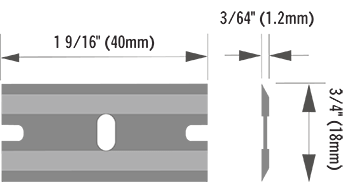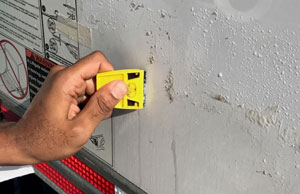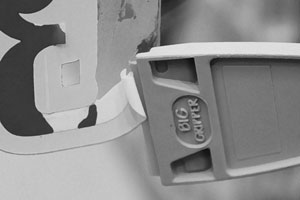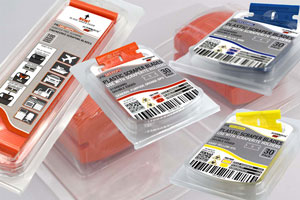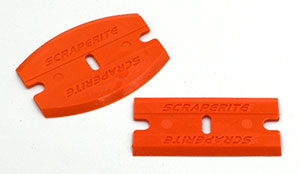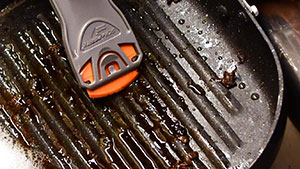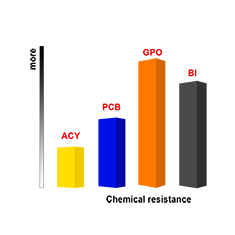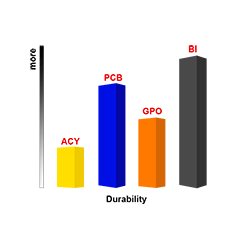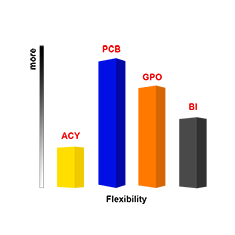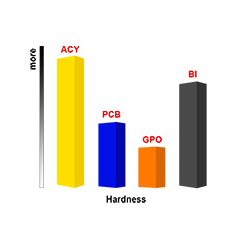Blade Types & Characteristics
BLADE CHARACTERISTICS
BLADE SELECTION = SUBSTANCE + SURFACE + SOLVENT
Scraperite blades have been developed using various engineered materials to meet an ever broadening range of use cases defined by our customers. Each blade could potentially be used on any surface, however, the solvents or chemicals used to clean the unwanted substance may destroy the blade or the underlying surface. The range of blade options ensures the right selection to match the surface being cleaned with the solvent used to remove the unwanted substance.
- No collecting germs
Blades naturally lift dirt up and away without picking up germs and can be easily wiped with a disposable cloth after each stroke, unlike scrubbing pads and sponges that collect dirt with every pass. Scraperite safety scrapers are much better at scraping targeted areas, on soft surfaces where metal blades or scrubbing pads would damage a wider area of the underlying surface.
- Low risk of property damage
- Low risk of injury
They offer added safety by reducing risk of injury by laceration and risk of property damage. Combined with the curved blade, it becomes our safest scraper combination yet. The curved blade allows the user to create a rotating or circular motion with the wrist to more easily lift things stickers off.
GENERAL
- non conductive
- non magnetic
- non corrosive non sparking*
![]()
![]() Recycling Codes 7 and PA - bring these back for commercial recycling. They'll get ground up, melted, and made into something else. Program available through our Official Reseller Network, return the used product to the seller and we'll do the rest.
Recycling Codes 7 and PA - bring these back for commercial recycling. They'll get ground up, melted, and made into something else. Program available through our Official Reseller Network, return the used product to the seller and we'll do the rest.
TYPES AND SPECIFICATIONS
STANDARD RECTANGLE
This original patented double-edged design of the Scraperite plastic blade is best for corner access and straight line scraping. It is the workhorse of the line, the plastic blades series that helped build the brand and remains a key tool in many applications.
SPECIALTY CURVED BLADE - CURVEY™
CURVEY is THE ultimate Plastic Safety Scraper
The curved plastic blade increases several safety factors by virtually eliminating sharp corners. This is the ideal safety scraper for any application and would probably be a buyer's first choice, unless sharp corners are required for the job. This blade only fits Tradesman Series Holders.
4 inch/10 cm WIDE PLASTIC BLADE
With 10 centimeter (4 inch) reach, this blade offers nearly 3 times the coverage area per stroke as our other blades. It is also nearly twice as thick as the standard original blade to achieve faster workflow with safe effective performance. The thickness makes the blade tougher, able to withstand repeated use and cover wide areas before requiring replacement.
BLADE COMPOSITIONS
General purpose orange - GPO
The Orange General Purpose safety scraper blade is a forgiving material soft enough to be used on most soft surfaces like other plastics, thanks to its natural lubricity and pliability. It also has good resistance to household and industrial chemicals making a great all-around blade for general use around the home or workplace. Ideal for use on wood furniture and flooring, LCD displays, glass stovetops and stone countertops, and many other soft surfaces found around us in every day life. This resistance to chemicals makes it ideal for removing decals with chemicals like acetone used to quickly break down the acrylic adhesives. This material is approved by Alcoa and Boeing for use on aircraft alloys.
![]() Recycling Code 7 - bring these back for commercial recycling. They'll get ground up, melted, and made into something else.
Recycling Code 7 - bring these back for commercial recycling. They'll get ground up, melted, and made into something else.
MEDIUM BLUE - MBL/PCB
These blades are tough. The polycarbonate base compound is similar to the materials used to make the bulletproof partitions often seen at banks and guard booths. These safety scraper blades provide a balance of pliability and strength, conforming to curves and rough surfaces with slightly better resistance to edge wear than the Orange blade. These blades are also good for use on ceramics and stone, as well as laminates and vinyl. Blue blades are tough enough for use in boat maintenance above and below the waterline, including handling tough barnacle scraping without damaging the anti-fouling paint. These PCB polycarbonate blue Scraperite blades are slightly reengineered for better performance.
![]() Recycling Code 7 - bring these back for commercial recycling. They'll get ground up, melted, and made into something else.
Recycling Code 7 - bring these back for commercial recycling. They'll get ground up, melted, and made into something else.
HARD YELLOW - HYL/ACY
This blade is made of a hard, brittle material and is the most rigid. Its low flexibility keeps it flat when removing stubborn substances from hard flat surfaces such as glass or tile but is more prone to breakage under vertical pressure. This characteristic also increases edge durability under similar circumstances compared with other blades. Solvent must be carefully selected to ensure blade material will not break down.
![]() Recycling Code 7 - bring these back for commercial recycling. They'll get ground up, melted, and made into something else.
Recycling Code 7 - bring these back for commercial recycling. They'll get ground up, melted, and made into something else.
BLACK INDUSTRIAL - BIN
The Black Industrial blades is an advanced engineered material ideal for trade professionals. Made of a highly durable chemical resistant compound, this blade offers a durable edge with high break strength yet flexible enough to conform to curved surfaces. Ideal for use where there is a lower risk of scratching the underlying surface and substance being removed requires heavy pressure. Similar to the Orange compound, it is suitable for use with chemicals used to remove RTV, other sealants, and pressure sensitive adhesive found in tape and stickers.
![]() Recycling Code PA - bring these back for commercial recycling. They'll get ground up, melted, and made into something else.
Recycling Code PA - bring these back for commercial recycling. They'll get ground up, melted, and made into something else.
SOLVENT RESISTANCE
| ACETIC ACID 10% | ||||
| ACETONE | ||||
| ALCOHOL: ISOPROPYL | ||||
| AMMONIA | ||||
| BENZENE | ||||
| BLEACH 15% | ||||
| CITRIC ACID | ||||
| DISH SOAP | ||||
| FORMALDEHYDE 40% | ||||
| FORMIC ACID 3% | ||||
| HYDROFLUORIC ACID 4% | ||||
| LYE | ||||
| METHYL ETHYL KETONE (MEK) | ||||
| NITRIC ACID 0.1% | ||||
| SULFURIC ACID 5% | ||||
| TURPENTINE | ||||
| VINEGAR | ||||
| XYLENE |
EDGE CHARACTERISTICS
| EDGE HARDNESS | SOFT | MED | HARD | MED |
| PLIABILITY | SOFT | SOFT | RIGID | MED |
| ABRASIVENESS | LOW | MED | HIGH | MED |
SURFACE CONSIDERATIONS
| DELICATE OR SOFT | |
| UNEVEN OR WAVY | |
| HARD FLAT | |
| UNEVEN OR ROUGH FINISH |
USE TEMPERATURE RANGES
| MINIMUM (°C/°F) | -50/-58 | -40/-40 | -40/-40 | -40/-40 |
| MAXIMUM (°C/°F) | 65/149 | 118/246 | 49/120 | 80/176 |
